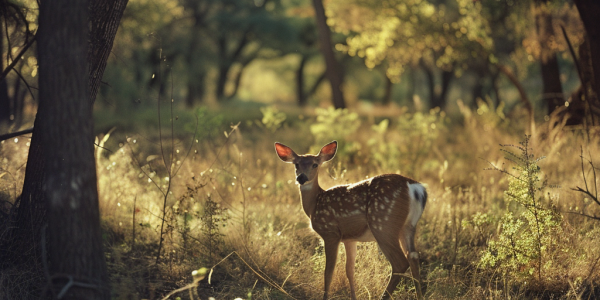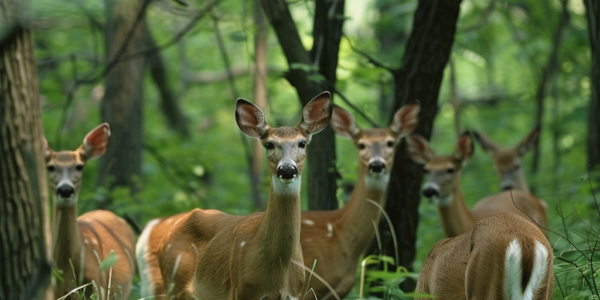Iowa DNR Warns of Rising Chronic Wasting Disease Cases as Hunting Season Begins
As the Iowa deer hunting season begins, the DNR warns of a significant rise in chronic wasting disease (CWD) cases. Hunters are urged to report sick deer and participate in testing to combat this fatal illness affecting the state’s deer population. With confirmed cases already on the rise, proactive involvement is crucial for managing CWD and protecting Iowa’s wildlife.
Concerns Rise Over Deer Health as Hunting Season Begins in Michigan
As Michigan’s firearm deer hunting season begins, concerns rise over the health of deer populations due to diseases like Chronic Wasting Disease (CWD) and Epizootic Hemorrhagic Disease (EHD). Experts, including Sonja Christensen from Michigan State University, emphasize the importance of monitoring these diseases for wildlife management and the implications for hunters. Understanding and addressing these challenges is crucial for maintaining healthy deer populations and ensuring sustainable hunting practices.
Chronic Wasting Disease Detected in Kerr County, Texas
Chronic Wasting Disease (CWD) has been confirmed in Kerr County, Texas, raising concerns for local wildlife management. The Texas Parks and Wildlife Department reported a positive case in a white-tailed doe, highlighting ongoing challenges with this fatal prion disease. Since its detection in Texas in 2012, CWD has spread among various deer species, prompting health officials to advise against consuming meat from infected animals. Stay informed about CWD and its implications for wildlife and public health.
Study Finds Limited Likelihood of CWD Transmission from Animals to Humans
A recent study by the NIH explores the transmission potential of chronic wasting disease (CWD) from cervids to humans. Despite concerns about prion diseases like CWD, the research suggests a significant species barrier preventing transmission to humans. The study utilized a human cerebral organoid model to investigate the likelihood of CWD transmission, providing reassurance about the limited risk to humans.
Chronic Wasting Disease cases in NC deer populations grow by 13 cases
Learn about the 13 new cases of Chronic Wasting Disease in NC deer populations confirmed by the NCWRC. Despite the increase in cases, the Wildlife Management Division Chief remains optimistic about the low number of positive results compared to the total number of deer tested.
Purdue University Researchers Seek Volunteers to Help Research Chronic Wasting Disease
Purdue University researchers are seeking volunteers to help study chronic wasting disease (CWD) in white-tailed deer. Participants will answer online survey questions and use a web app to understand how CWD may spread. The study is open to everyone 18 years or older and requires only a computer or tablet. Visit Purdue’s website to participate.
Chronic Wasting Disease Found in Maryland National Parks
White-tailed deer in Maryland national parks have tested positive for Chronic Wasting Disease (CWD), a contagious and fatal disease causing physiological and behavioral changes. The discovery was made during deer reduction operations, prompting officials to advise park visitors to avoid consuming venison from CWD-positive deer and report any sick or dead wildlife.
Chronic Wasting Disease: The Silent Spread of ‘Zombie Deer Disease’
Chronic wasting disease (CWD), also known as ‘zombie deer disease’, is spreading among deer populations, raising concerns due to its potential ecological and human health risks. The disease is caused by misfolded proteins called prions, which are notoriously resilient and can persist in the environment for years. While there is no conclusive evidence that CWD can directly infect humans, concerns persist due to the potential transmission of prions responsible for CWD to human cells under laboratory conditions, as well as the inadvertent consumption of infected animals by humans. The difficulty in detecting and diagnosing prion diseases in humans further complicates the situation, highlighting the urgency for measures to mitigate risks.
Chronic Wasting Disease Detected in British Columbia
The Province of British Columbia has responded to the first cases of chronic wasting disease in the region, as two deer samples from the Kootenay Region have been found to be affected. Chronic wasting disease is a fatal infectious disease…
Ohio’s Deer Population Struggles with Chronic Wasting Disease
An area in Ohio has been experiencing an expansion of a fatal deer disorder, known as chronic wasting disease (CWD). The implications for the future of deer hunting remain uncertain, although hunters appear largely undeterred by the development. While there…










